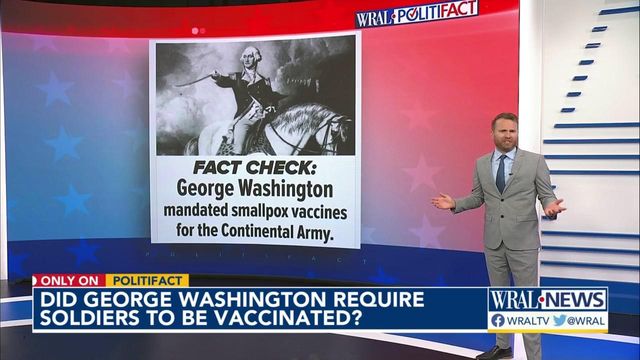Fact check: Did George Washington mandate vaccines for his army?
"George Washington mandated smallpox vaccines for the Continental Army," reads the text of an image that's being shared on social media with an illustration of the first president of the United States on horseback. PolitiFact checks the claim.
Posted — UpdatedPresident Joe Biden recently said he asked the Defense Department to explore "how and when they will add COVID-19 to the list of vaccinations our armed forces must get, drawing the criticism of people opposed to vaccine mandates.
But those critics have their own detractors.
"George Washington mandated smallpox vaccines for the Continental Army," reads the text of an image that’s being shared on social media with an illustration of the first president of the United States on horseback.
"Could you imagine if his soldiers behaved like the GOP?" wrote one person who tweeted the image.
Infrequent outbreaks and wariness of inoculation made his troops very susceptible to the disease," according to the library. "After heavy losses in Boston and Quebec, Washington implemented the first mass immunization policy in American history."
Washington issued the order to have all troops inoculated on Feb. 5, 1777, in a letter to John Hancock, who was president of the Second Continental Congress. In another letter, Washington ordered all recruits arriving in Philadelphia be inoculated.
"Finding the smallpox to be spreading much and fearing that no precaution can prevent it from running through the whole of our army, I have determined that troops shall be inoculated," he wrote. "This expedient may be attended with some inconveniences and some disadvantages, but yet I trust in its consequences will have the most happy effects. Necessity not only authorizes but seems to require the measure, for should the disorder infect the army in the natural way and rage with its virulence we should have more to dread from it than from the sword of the enemy."
By the end of 1777, about 40,000 soldiers had been inoculated against the disease.
"The enemy, knowing it, will certainly take advantage of our situation," he wrote at the time.
But inoculating recruits as soon as they enlisted meant they contracted the milder form of the disease at the same time they were being outfitted for war, and they would be healed by the time they left to join the army, according to the library.
Back then, the inoculation process was called variolation, named after the virus that causes smallpox — the variola virus.
PolitiFact ruling
The image claims, "George Washington mandated smallpox vaccines for the Continental Army."
The shorthanded history is basically right. The smallpox vaccine didn’t exist when Washington was commander in chief of the Continental Army, but the point remains: he ordered the inoculation of troops against smallpox by the means that was then available, variolation.
We rate this post Mostly True.
Copyright 2024 Politifact. All rights reserved.





